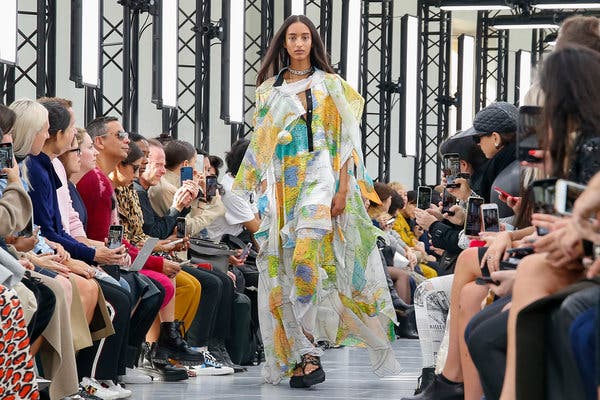PARIS — The morning of Jacques Chirac’s funeral the sun came out. There was an autumn crispness to the air and Paris was, on Monday, as it is wont to be at such times, gleaming with pomp and a sense of circumstance past. President Vladimir V. Putin of Russia was in town; so was President Bill Clinton. So were a number of other world leaders, come to pay their respects to a man who once led France.
As a crowd gathered for the Sacai show in the Grand Palais, a motorcade went by. The fashion gang watched the black cars and the accompanying vehicles, and then filed upstairs to discover — George Clinton, the Parliament Funkadelic founder, sitting front row. It was a less jarring segue than it sounds.
The designer Chitose Abe had taken the band’s album, “One Nation Under a Groove,” as the inspiration for a collection that was effectively an argument for unity: of big oversize trousers and hard-core trench coats and sheer, weightless blouses spliced into a single jumpsuit; of many, many different size polka dots; of cartographic prints, flickering hither and yon on the points of scarf dresses and suits.

We are the world! Or at least the world map. It was fitting. This is a time to come together.
Or at least mostly it is: The security guards at Chanel were less keen to embrace the catwalk crasher who ran down the bleachers to hop into the final parade across the roofs-of-Paris set that the designer Virginie Viard had created in the Grand Palais. She turned out to be a French YouTuber and comedian known as Marie S’Infiltre, doing her thing.
Ms. Viard, however, seems to have not yet found her thing. She has the unenviable job of following the legend that was Karl Lagerfeld, and is certainly going through the motions of continuity, from the big sets to the classic Chanel bouclé-and-pearl-isms, petite Parisienne coats and dresses. And she is trying for an update. But shorts — short coat-rompers, metallic pink leather matching shorts and jackets, teeny black Lycra … hot pants? paired with sparkling tops and a chain belt — do not currency (or youth) make.
Save that last combo, which was so subversively peculiar, it was kind of fun, and the final looks, which combined completely casual long skirts and shirts with sparkling silver embroidery like a blasé shrug in face of fancy, it all feels very minor. The motions are there, but there’s no oomph. The soul and animating wit that extended from Coco to Karl are missing. They need to be reunited.
Maybe we all do. Designers are making the point in somewhat unexpected ways.
It was unexpected, for example, to arrive at the Opéra Garnier, the Second Empire theater with a Chagall ceiling, for Stella McCartney’s show and discover that all over the gold interior there were videos playing of bears and zebras and monkeys and armadillos (and other kinds of animals) — enthusiastically engaged in the act of procreation.
That’s one way to underscore the importance of communion.
Another is basing the cut of a simple blouse or pair of trousers or lace dress on the circle, as Ms. McCartney did in scalloped cottons that curved around the arms and legs, potentially unforgiving volumes she aerates with ease, mixed in with cool safari suiting and loose halter dresses covered in photographic flower field prints she shot during on a bike ride in the countryside.
The show’s notes suggested the circle represented “life, vitality, femininity,” which it does, but it also represents the circular economy, the holy grail of climate change, where instead of waste we create regenerative life cycles for products. How’s that for sexy fashion talk?
It’s also a lot of symbolism for clothes to contain, and these particular clothes didn’t, entirely — they mostly just looked cool and uncomplicated to wear — but in case you missed it (and maybe it doesn’t matter, if consumers get the clothes) on every seat was a green (duh) paper detailing Ms. McCartney’s milestones when it came to sustainability: PVC-free, angora-free, mohair-free, plastic-bottle free, solar panels in stores and so on.
She has been a proponent of animal rights since she founded her business, and increasingly an activist trying to wake fashion up to climate change. Mostly, the industry has decided to join her.
Yet, in focusing so much on materials, legitimate as that is, another dimension of sustainability tends to be overlooked: the part that is not simply about chemistry and landfill but also community, communication, employment, the passing on of tradition. As Sarah Burton at Alexander McQueen made clear in a collection rooted in the nexus of man and earth and sky, where another kind of extinction was in the offing.
It opened with a simple puffed-sleeve dress in white linen, which had been naturally bleached by being left outside in the sun. And it ended with skinny black pants under a jacket lavishly draped in what turned out to be toiles reimagined as oily beetled linen (beetling being a once-common process in which fabric is painted with potato starch and then pounded by large wooden blocks).
In between was a leather and lace coat with actual flowers preserved in its folds, a sleeveless dress covered in swirling sketches made by students at Central Saint Martins and hand-embroidered on by every member of her atelier, like a sewing circle of old, and some exactingly cut black tailcoats spilling acres of lace upcycled from old collections. Among other things.
The silhouettes were relatively simple for McQueen, which can tend to err on the side of the mythological, but the damask-look linen was woven by the by someone described by the house as the last damask linen weaver in Northern Ireland (The beetler was also said to be the last of its kind in that country). At the end of the show, Ms. Burton brought her studio staff out for a bow. They scooched along, like one entity.







